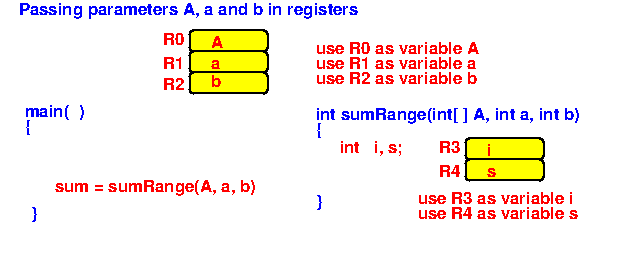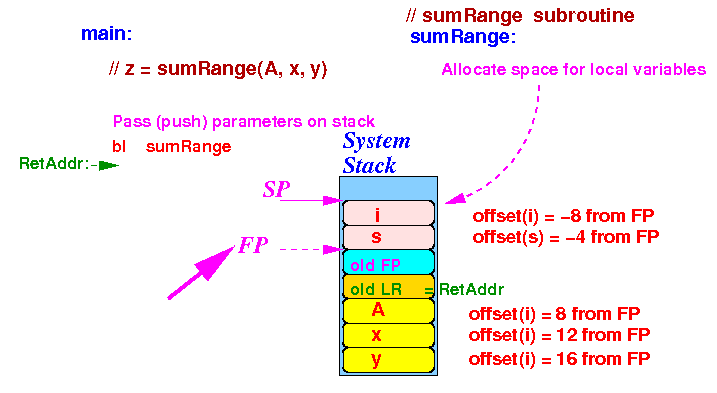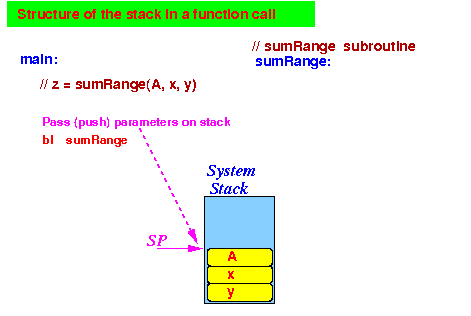For simplicity sake, I will write the same (leaf function) sumRange( ):
public class MyCLass {
public static int sumRange(int[] A, int a, int b )
{
int i, s;
s = 0;
for (i = a, i < b; i++)
s = s + A[i];
return(s);
}
public static void main( )
{
int[] A = {11,12,13,14,15,16,17,18,19,20};
int x, y, z;
z = sumRange(A, x, y);
}
}
|
Difference:
I will
allocate parameters and
allocate local variables
on the
runtime stack
I.e.:
the stack technique is
general and
it will
also
work for
leaf functions !!!
How we used registers to store the parameters and the local variables:

Disadvantage: sumRange( ) can not call another function (its parameters and local variables will be overwritten !!!)
What this example will construct on the runtime stack:

Advantage: sumRange( ) can call another function (because its parameters and local variables will not be overwritten !!!)
// Java statement: sum = sumRange(A, a, b):
main:
/* -------------------------------------------------
Pass 3nd parameter value b using the stack
------------------------------------------------- */
movw r0, #:lower16:b
movt r0, #:upper16:b
ldr r0, [r0]
push {r0}
/* -------------------------------------------------
Pass 2nd parameter value a using the stack
------------------------------------------------- */
movw r0, #:lower16:a
movt r0, #:upper16:a
ldr r0, [r0]
push {r0}
/* -------------------------------------------------------
Pass 1st parameter address of array A using the stack
------------------------------------------------------- */
movw r0, #:lower16:A
movt r0, #:upper16:A
push {r0}
/* ----------------------------------------------------------------
|
sumRange:
// When sumRange begins, we will have the parameters on the stack:
|
Key:
use
FP + offset to
access the
parameters and
local variables in the
stack frame !
DEMO:
/home/cs255001/demo/asm/8-sub/stack1.s
 call sum = sumRange(A, a, b)
agreed inputs: r0 = addr of array A, r1 = a, r2 = b
agreed return: r0 = return value
---------------------------------------------------------------- */
bl sumRange
add sp, sp, #12 // Clean up the 3 int parameters off the stack
/* -----------------------------------------------------------------
Assign return value (in r0) to variable sum (sum = sumRange(..))
----------------------------------------------------------------- */
movw r1, #:lower16:sum // Do NOT use r0 !!!
movt r1, #:upper16:sum // (Because r0 contains the return value)
str r0, [r1] // This will store return value in sum
// ===========================================================
.data
DataStart:
A: .4byte 11, 12, 13, 14, 15, 16, 17, 18, 19 , 20
a: .4byte 1
b: .4byte 3
sum: .4byte -1
DataEnd:
call sum = sumRange(A, a, b)
agreed inputs: r0 = addr of array A, r1 = a, r2 = b
agreed return: r0 = return value
---------------------------------------------------------------- */
bl sumRange
add sp, sp, #12 // Clean up the 3 int parameters off the stack
/* -----------------------------------------------------------------
Assign return value (in r0) to variable sum (sum = sumRange(..))
----------------------------------------------------------------- */
movw r1, #:lower16:sum // Do NOT use r0 !!!
movt r1, #:upper16:sum // (Because r0 contains the return value)
str r0, [r1] // This will store return value in sum
// ===========================================================
.data
DataStart:
A: .4byte 11, 12, 13, 14, 15, 16, 17, 18, 19 , 20
a: .4byte 1
b: .4byte 3
sum: .4byte -1
DataEnd: